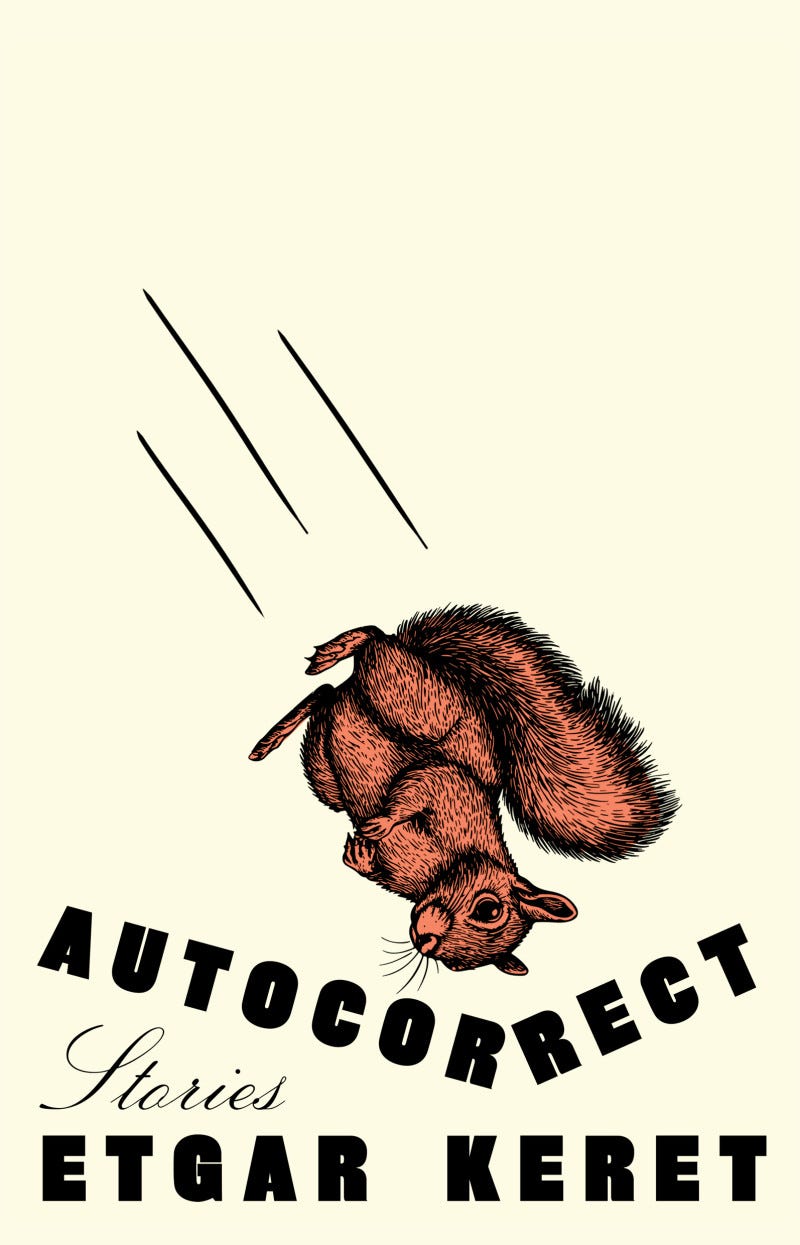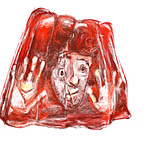I wrote my first short-story collection, Pipes, during my compulsory military service, and it was a lot more than just a book to me. My reality at the time felt arbitrary, harsh, and not always understandable. The stories I wrote were a sort of safe space, where I could regulate my breath and find a deeper understanding of what I yearned for and what I was afraid of.
In the thirty-three years since Pipes came out, I’ve published six more books for adults, all of which occupied a significant space in my life, yet they were written from a place of relative stability and normality.
Autocorrect, my new collection, which will be out soon from Riverhead in the U.S. (May 27, 2025), was written in a frightening period of strife and murderous violence in my region, as in much of the world. The more menacing and alienating things got, the more my writing resumed its original role: an emotional survival mechanism that seeks to decipher the world and my own soul, and tries to untangle the suffocating knot they’re tied into.
Writers always love their books, and I’m no exception to that rule. I love all of my books, but I love Autocorrect even more. Both because it supported me through some terrible times, and because it helped me understand that no matter where the future takes us, however dark our reality becomes, I can always exist in it just as I am: weak, defeated, and afraid, but still myself.
In honor of the new book's release, here's a sneak peak: "Strong Opinions on Burning Issues," a story that first appeared in Alphabet Soup.
STRONG OPINIONS ON BURNING ISSUES
It was small, stuck on the bottom of the obituaries page like a scared orphan hiding among the headstones. Do you have strong opinions on burning issues? the headline asked, and printed under it, instead of an answer, was: now you can make a lot of money from your opinions, all in black letters except for the words strong, burning, and money, which were bright red.
The job interview took place in a makeshift, windowless office on the parking level of a mall, with a pleasant‑faced woman who was short enough to be a dwarf.
“I bet you’re swamped with applicants, what with the recession and all.” Yinnon tried to sniff out the territory.
“Not really,” the dwarf said, “we didn’t get as many calls as we expected.”
“That has to be because of where the ad appeared,” Yinnon said. “The paper screwed you. Instead of putting it with the classifieds, they stuck it on the obituaries page.”
“‘Screwed you,’” the dwarf repeated Yinnon’s words with a smile. “Very nice. You see? You’ve already expressed a strongly critical opinion of the media.”
“I have a lot more opinions,” Yinnon said eagerly. “Really!”
“Wonderful,” the dwarf said. “Can you please give me some examples?”
Yinnon cleared his throat. “I think there is something after death, something very real and sad and lonely, even though we can’t put a name to it. I think children should respect their elders, even when their elders are wrong. I think fear causes people to make bad decisions. I think Israeli soccer players have no business in the top European leagues.”
“I’m not sure you’re the right person for us,” the dwarf said, lighting a long, thin cigarette.
“Why not?” Yinnon protested. “Because of what I said about children? I want you to know that deep inside, I’m a very warm and liberal . . .”
But the dwarf interrupted him: “The ad specifically said that the opinions have to be strong and about burning issues. And although respecting elders is all well and good, it’s far from being a topical issue.” “I think we should bring back the death penalty,” Yinnon blurted. “Why hang Eichmann and not Arabs? Just because he was German? That’s reverse discrimination. Discrimination against Europeans, that’s what I think.” And after a moment of silence, he banged on the table and added, “Chutzpah, that’s what it is.”
“Okay,” the dwarf said, “let me tell you more about the job.”
The dwarf sent Yinnon to be interviewed in street polls, for local channels at first, but she promised it would only be for a few months, so he could test his wings, and then he would move to national channels. If he proved himself in the polls, she said, he might even be promoted to being a panelist or analyst. The job was challenging and required Yinnon to express an opinion on every subject, one that would reflect public mood or anger listeners, preferably both. The first few times he spoke, the caption on the bottom of the screen read, Yinnon Menkin – Dental Technician. But the dwarf explained to him that it was temporary, just until he became better known, and soon enough the title changed to Yinnon Menkin – Opinion Holder.
People on the street began to recognize him. Their reactions were positive or indifferent, never negative. A girl named Ziva said to him in the supermarket, “I remember you! You’re the one who yelled on the news yesterday. What exactly was that about?” And that innocent question led to a conversation, the conversation to friendship, and later—on Rosh Hashanah, to be precise—the friendship led to consensual sex. On Yom Kippur eve, as they strolled along a Tel Aviv avenue, kids with buzz cuts sped past them on bicycles and e-scooters.
“I don’t think kids should ride bikes on Yom Kippur,” he said to Ziva. “It’s like spitting in the eye of tradition, and a nation that educates its children to disrespect its traditions and leaders is a nation that—”
“Time out,” Ziva said, smiling as she reached for his hand. And so they walked down the middle of the street without saying a word for an entire hour.
Later that week, he was a guest panelist on a political program. The woman on his left, an Arab, if he wasn’t mistaken, or a religious Jew, or any of those women who wear a piece of cloth on their head, kept yelling at the moderator that he should be ashamed of himself. When it was Yinnon’s turn to speak, even before he could get a word out, she muttered to herself and the microphone, “Privileged white guy.” Yinnon wanted to respond with something scathing but also uplifting, something about how love heals almost everything and how, since he met Ziva, she had brightened his life like a sun that paints reality in soft watercolors. But he knew none of that would go over well on TV, so instead, he shouted, “Lady, this isn’t Iran here! Get that rag off your head.” By that point, the audience was applauding ecstatically, and Yinnon knew he could go back to basking in his warm, pleasurable thoughts about Ziva and the discussion would keep going on its own.
After that show, the dwarf called him in for a talk and said she was worried, his screen presence wasn’t what it used to be, he seemed lost, weakened. Yinnon nodded and asked her to send him back to street interviews, but she said that was impossible because he was too well‑known, and after a few pathetic appearances as a panelist, he parted ways with her.
Less than a week later, he came across a succinct ad in the classifieds: wanted: people in love, and under it, with no syntactic logic, the word money appeared, followed by three exclamation points. Yinnon called. That job interview took place in the same mall, except this time, the interviewer was a fat guy with a goatee. He explained to Yinnon that he produced a game show called True Love, featuring couples in love. Each episode, one member of the couple is placed in a horrible situation and the other has to sacrifice something to save them. “In America, they did it with illegal immigrants, and it was a smash hit,” the fat guy said, “but here in Israel, people are more conservative.”
At first, Ziva didn’t want to compete, but when she understood how important it was to Yinnon, she agreed. On the first show, they made her lie down on a nest of flesh‑eating fire ants, and Yinnon had to feed them his left eyeball to save her. In the semifinals, Ziva was forced to do a sexy striptease to save Yinnon from the murderous fists of a violent Uzbek wrestler. On the final show, Yinnon had to drink a large quantity of his own urine through a straw to save Ziva from a series of fatal electric shocks.
Ziva and Yinnon won a lot of money, as well as a pure gold, diamond‑studded doorplate adorned with an arrow-pierced heart between their names. The host was shocked when, smiling shyly, the couple that had been willing to sacrifice so much in the name of love told him they weren’t living together yet. That was the last time they appeared on TV. On the way back from the studio, a truck driver who fell asleep at the wheel veered out of his lane and rammed right into them. Yinnon had once been on a panel discussion about road fatalities, where he launched an unprecedented attack against Israeli drivers’ mentality, but that didn’t matter now. The accident was horrendous, and as the injured Ziva tried in vain to resuscitate him, Yinnon had already discovered that he’d been right, there really was something after death. Something sad and lonely. Something you couldn’t call by name.
Autocorrect is available for pre-order at your favorite indie bookstore, or here!













Share this post